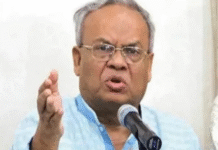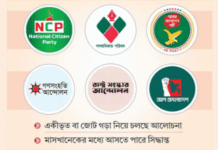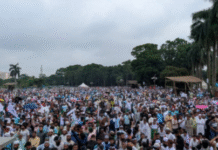
“I want to remind the Prime Minister that time is running out…there’s an importance of talks and negotiation in democracy. We think still there’s a scope for talks,” said BNP spokesman Shamsuzzaman Dudu.
He, however, warned the government that the opposition will realise their demand through a street movement if it refuses to sit for dialogue. “There will come a time when no dialogue will be needed, and the solution will be on the street, which you and your alliance will have to accept.”
Dudu, an adviser to the BNP chairperson, was addressing a press briefing at the party’s Nayapaltan central office.
He said the Prime Minister had showed the nation a light of hope by offering a dialogue to resolve the problem over caretaker government ahead of UN Assistant Secretary General for Political Affairs Oscar Fernandez-Taranco’s visit to Bangladesh.
“But the government didn’t send any letter to the opposition in this regard despite their announcement to do so. We’d tried to sit in a dialogue putting many things behind. But the Prime Minster dashed the hope,” the BNP leader alleged.
Dudu criticised the government for rearresting senior BNP leaders at jail gates in false cases after their release from jails on bail.
Terming the government’s attitude very painful, he said the government is least bothered about court and law and the rules and regulations, and it has turned the country into a police state.
Pointing at the Prime Minister, the BNP leader said,” Your father had been put in jail in false cases. Moulana Bashani together with people had freed him through a movement of violence, torching and siege. We want to ask the Prime Minister, will we take up such programmes?”
Describing the ban on meetings and rallies as undemocratic and unconstitutional, he said Jatiyatabadi Chhatra Dal, the associate student body of BNP, brought out processions at different parts of the city defying the restriction.
The government will not be able to resist the political programmes through the ban, repression and arrest of the opposition leaders and activists, he added.
Sought comment about Hefajat-e-Islam secretary general Junaid Babunagari’s ‘confessional’ statement that the 18-party had patronised the Islamist group to oust the government, Dudu said, “Allah knows what he said before the magistrate in absence of newsmen and lawyers. In many cases we saw in the past the statement made under section 164 CrPC doesn’t exist finally.”










Atheist, Agnostic, Apostate-Communist surrounded wayward, “JONOGON-ABANDONED, anti-Islamic Hasina’s thuggish government has stooped to the lowest.
Hefajot’s ZUNAED BABUNOGORY’S “ CONFESSION” fits 100% to the charged already made by both the Awami rulers & the Police officers against their political opponents.
This kind of getting forced confession has become the norm of this corrupt government that has destroyed states almost every institution by politicking it. Judiciary, Education and Law enforcing agencies politicization has destroyed the very base of the structure of a just society being used as political tools in the hands of this corrupt government. What wonder no person (home or abroad) has any more trust in these institutions? (3)—-
Have we got any “HEAD OF THE GOVERNMENT”?
What hell is going on? Who is steering the boat-wheel? Does any co-ordination exist between the ministry & P.M’s office? Or she is too frightened, too weak or unable to control the rabble rouser-thugs?
Minister Latif Siddiqui’s letter written on his ministerial letter head to USA’s Ambassador is now said to be ” A PRIVATE LETTER” that expressed his personal opinion, according to Srimoti Dipumoni.
Now Parliamentary committee said, Home minister Alamgir’s undemocratic & condemned DECREE was “HIS PERSONAL OPINION”!!! (2)
“IS IT ANOTHER PLOY BY FOREIGN NGO TO DIVERT WORLD ATTENTION & TO SAVE THE WAR CRIMINALS”?- TUKU, Deputy Home Minister
“THE ENEMIES OF OUR STATE WHO OPPOSED OUR FREEDOM IN 1971 ARE FEEDING THE BRITISH NGO AMNESTY WITH FALSE INFORMATION TO MALIGN OUR DEMOCRATICALLY ELECTED GOVERNMENT”
-HANIF Joint Secretary General of ruling Aweami League. by-Abul Kalam Talukdar:Feni:
Bangladesh: Investigate deaths in protest clashes to prevent more bloodshed
Bangladesh’s Hifazat-e-Islam Secretary General, Junaid Babu Nagari, was called before a court in Dhaka following the protests.© STR/AFP/Getty Images. http://www.amnestyinternational.org
“ There is considerable confusion about what really happened, and why the deaths occurred. There must urgently be an immediate independent and impartial investigation into the events, including the police use of force. The perpetrators must be brought to justice ” Source: Polly Truscott, Amnesty International’s Deputy Asia-Pacific Director Date: Tue, 07/05/2013 (1)—-
The Bangladeshi authorities must immediately set up an independent and impartial investigation into police use of force after at least 44 people died in violent clashes between protesters and the police, Amnesty International said. Tens of thousands of supporters of the Islamist group Hefazat-e-Islam took to the streets in the capital Dhaka and elsewhere in Bangladesh on 5 May and the early hours of 6 May. They demanded the introduction of stricter religious laws, including the introduction of a blasphemy law and restrictions on women’s human rights, including their freedom of movement. The demonstrations turned violent as protesters clashed with police in Dhaka. “There is considerable confusion about what really happened, and why the deaths occurred. There must urgently be an immediate independent and impartial investigation into the events, including the police use of force. The perpetrators must be brought to justice,” said Polly Truscott, Amnesty International’s Deputy Asia-Pacific Director. (2)—-
Protesters were seen on TV channels in Bangladesh to be attacking police, setting buses, cars, small shops and book stalls on fire. Police was seen to be using tear gas, rubber and live bullets at the protesters. At least two of the dead are policemen and one was a Bangladesh Border Guard (BGB). The circumstances of the protests are disputed, with police claiming the violence erupted on 5 May when protesters tried to storm a police barricade, and then pelted police officers with stones and bricks. A police operation in the early hours of 6 May led to a new round of clashes. Police have confirmed four deaths from 5 May but have remained silent about the deaths on 6 May. Media reports estimate a total of 22 deaths in Dhaka over both days. Unofficial figures from hospitals that Amnesty International has obtained also confirm 22 deaths. (3)—-
Outside of Dhaka, protests in Narayanganj, Bagerhat and Chittagong (Hathazari) districts on 6 May left at least another 22 people dead. In total, Amnesty International has been able to confirm the protest-related deaths of at least 41 civilians and three police or security force personnel across the country on 5 and 6 May. The opposition Bangladeshi National Party (BNP) claims that more than 1,000 people have been killed, but this has been dismissed by the government. “This is an extremely volatile situation and there is still a risk of further violence. All law enforcement personnel must abide by international law enforcement standards and ensure that they do not use excessive force in dealing with the protesters,” Truscott said. (4)—-
“Firearms should be used by the police to the minimum extent necessary to defend themselves or others against an imminent threat of death or serious injury. They are a last resort, and should only be used when less extreme means are insufficient to achieve these objectives”. Hefazat-e-Islam has called a general strike all over Bangladesh on 12 May, while police have banned gatherings of more than five people in the capital Dhaka. Hefazat-e-Islam is a relatively newly formed religious grouping mainly composed of madrassa (Islamic school) students and teachers. Their protest on 5 May was the second in a series of demonstrations organized to push for their demands. The first protest on 6 April was largely peaceful. They initiated their second mass protests, also known as the “Dhaka siege”, to call on the government to implement their 13-point agenda, which includes the introduction of blasphemy laws, restriction on women’s movements and the death penalty for those found guilty of insulting Islam. (5)